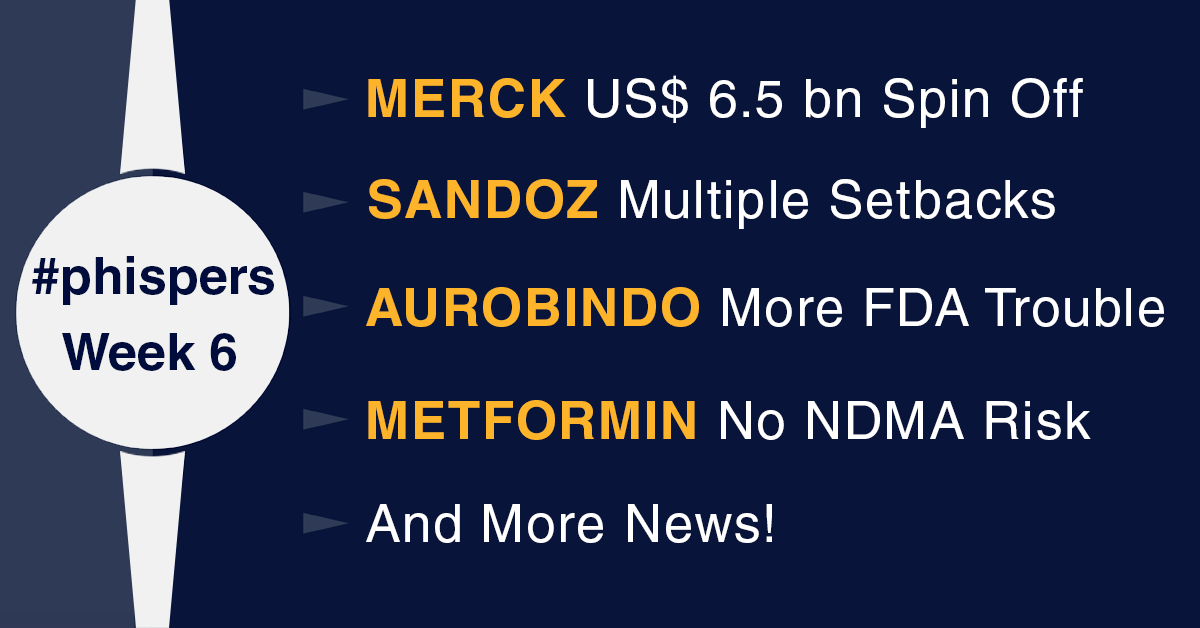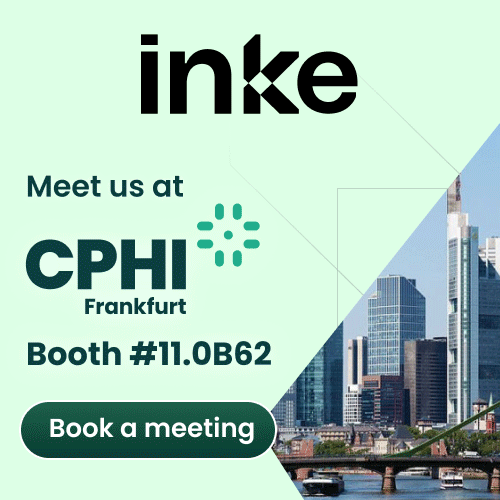
By PharmaCompass
2020-02-06
Impressions: 3308
This week, Phispers brings you news on Merck as the drugmaker spun off its slowing-growing drugs into a new drug company with US$ 6.5 billion in annual sales.
This will allow Merck to focus more on areas like oncology.
Biogen survived a patent challenge to its multiple sclerosis drug — Tecfidera — by Mylan.
Catalent, announced it will acquire Belgium-based cell and gene therapy CDMO MaSTtherCell Global for US$ 315 million.
Novartis said it has stopped work on the generic version of GSK’s Advair.
Its generic firm Sandoz lost a case against United Therapeutics over generic versions of its top-selling drug Remodulin.
United Therapeutics though had some bad news of its own, as its drug dinutuximab failed a Phase II/III study.
Meanwhile, Indian drugmaker Aurobindo’s oral solid dosage facility in Telangana got classified as OAI by the FDA.
And the FDA said no tested samples of the type 2 diabetes drug metformin contained unacceptable levels of NDMA.
Merck spins off
slower growing drugs into new US$ 6.5 billion company
US-headquartered Merck, which is known as MSD (short for Merck Sharp & Dohme) outside the United States and Canada, announced it will spin off its women’s health drugs, biosimilar drugs and older products to create a new pharmaceutical company with US$ 6.5 billion in annual sales.
The new company’s assets currently make up around 15 percent of Merck’s total sales. These are its older, slower-growth products. Merck rivals, such as Pfizer and GlaxoSmithKline, have made similar moves in the past.
Women’s health drugs like Nexplanon, a long-acting contraceptive implant, Merck’s off-patent medicines, including the cholesterol drugs Zetia and Vytorin, will become part of the new company.
Merck expects the transaction to be complete by the first half of 2021 and forecasts generating operating efficiencies of over US$ 1.5 billion by 2024 as a result of this spin-off.
This move will allow Merck to concentrate on a few areas, particularly oncology where its immunotherapy Keytruda has become one of the world’s top selling drugs. Keytruda, by itself generates US$ 11 billion in annual sales and its sales grew 55 percent in 2018. The company will also keep its businesses in vaccines, animal health and hospital drugs.
Biogen survives
major patent challenge to its MS drug by Mylan
In a high-stakes patent challenge to its big-selling multiple sclerosis drug — Tecfidera — by Mylan, drugmaker Biogen came out triumphant. Last year, Tecfidera had generated US$ 4.43 billion in sales for Biogen, and had made up for about 30 percent of its global sales.
Losing the IPR challenge would have meant an early launch of a generic and less expensive version of Tecfidera.
Mylan had challenged Biogen’s ‘514 patent on Tecfidera, which expires in 2028, and last year the US Patent and Trademark Office had decided to strike up an inter partes review.
In the decision announced this week, the patent judges determined that Mylan had “not demonstrated by a preponderance of the evidence the unpatentability of claims” it challenged.
Apart from the inter partes review, Mylan is challenging the patent in West Virginia federal court. Other companies are challenging the patent in Delaware federal court. Judgments in those cases are expected this year.
After buying
Paragon last year, Catalent buys MaSTherCell for US$ 315 million
Catalent is acquiring MaSTtherCell Global, a Belgium-based cell and gene therapy CDMO (contract development and manufacturing organization) with operations in Europe and the US for US$ 315 million. MaSTtherCell is a subsidiary of Orgenesis.
Catalent had carved a place for itself in gene therapies by acquiring Paragon Services last year for US$ 1.2 billion. Therefore, its acquisition of MaSTtherCell only strengthens its position in gene therapy. The acquisition is expected to close by the end of March this year. Catalent will acquire MaSTtherCell’s three sites along with about 240 employees.
With this acquisition, Catalent is getting MaSTtherCell and its 32,000 square-foot facility in Houston and a 25,000 square-foot facility in Gosselies, Belgium. It is also building a 60,000-square-foot operation that is expected to employ 250 people when it is completed in 2021.
Catalent CEO John Chiminski said in a statement that MaSTtherCell’s experience with T-cell receptors, CAR-T therapies and mesenchymal stem cells will allow Catalent to fill out its gene therapy capabilities, while Catalent can help MaSTtherCell build out its commercial operations.
Sandoz drops
work on generic Advair, loses case against United Therapeutics
Novartis said it has stopped work on the generic version of GlaxoSmithKline’s lung treatment Advair (fluticasone/salmeterol), after working on it for years. This disclosure was made while the Swiss drugmaker announced its fourth quarter earnings, which showed that sales of its generic drugs outfit — Sandoz — have decreased by 1 percent globally and by 10 percent in the US in 2019, compared to the same period in 2018.
“Following a recent review of our data readouts, we no longer see a pathway to launch in the next 18 months and, as a result, we’ve decided to discontinue further development,” said Richard Saynor, CEO of Novartis’ Sandoz division.
Novartis has recorded an impairment charge of US$ 442 million related to its write-down of the Advair generic program.
Novartis’ Advair ambitions had first received a setback in 2018. After accepting Novartis’ Advair generic application in 2017, the FDA had rejected the program in February 2018 and had also requested for more data. At the time, Novartis had said it would work with the agency to make the generic available soon.
Novartis’ decision leaves Mylan in a stronger position as the sole drugmaker to bag FDA nod for a generic version of Advair. Mylan’s generic Advair won the FDA approval last year after a number of slip-ups of its own.
There is more bad news from Sandoz. In April last year, Sandoz and its generic marketing partner RareGen had taken United Therapeutics, a Maryland-based biotech, to court alleging that it had engaged in anticompetitive measures to thwart generic versions of its top-selling drug — Remodulin — from capturing a market share.
Last week, a New Jersey federal judge ruled that United could continue to enforce an exclusive deal with a device maker (Smiths Medical ASD, Inc) for prescriptions of its cardiovascular drug Remodulin, effectively shutting generic competitors out of the market. The ruling denies the request for preliminary injunction sought by Sandoz and RareGen, a statement said.
United’s cancer drug fails trial: United Therapeutics had some bad news of its own. The drugmaker announced that a Phase II/III study testing dinutuximab (Unituxin) did not meet the main goal of helping patients live longer.
Dinutuximab is an antibody drug developed to bind to GD2, a molecule expressed on the surface of some cancer cells. The FDA approved the drug in 2015 as a treatment for a high-risk and rare type of pediatric cancer. In 2018, United Therapeutics reported that the drug generated US$ 84.8 million in sales. The company has been trying to broaden its portfolio beyond pulmonary arterial hypertension products, which account for a large share of its US$ 1 billion annual revenue.
Although United has over a dozen studies looking at the original Unituxin in different types of neuroblastoma, this Phase II/III appeared to be one of the biotech’s last attempts at showing the original antibody can be effective in a new cancer type.
Aurobindo’s oral solid dosage facility gets classified
as OAI
The US Food and Drug Administration has classified Indian generic drugmaker Aurobindo Pharma’s facility in Telangana as Official Action Indicated (OAI), which means that the agency found “objectionable conditions” at this facility and that regulatory action has been recommended.
The FDA had inspected Aurobindo’s manufacturing facility in Telangana from September 19 to September 27 and had raised concerns over the data generated at the site. A review of the Form 483 issued after the inspection revealed that Aurobindo had invalidated over 90 percent of the out of specification (OOS) investigation results related to product stability, raw materials and hold time studies.
In the case of one investigation, Aurobindo’s chemists simulated multiple hypothesis studies to confirm the cause of the OOS result. After reviewing the investigation, the FDA inspectors “were unable to determine if the hypothesis studies were actually conducted”.
Aurobindo’s inability to resolve the issues raised in the inspection led to the OAI being issued by the FDA. The Indian drugmaker has been having a bad run with the agency since last year, when the FDA classified three of its facilities as OAI. No other company has received more than two OAI classifications related to drug quality assurance last year.
However, Aurobindo Pharma seems unfazed. It believes that this OAI classification will not have any material impact on the existing revenues or the supplies to its US business at this juncture.
Metformin doesn’t carry any NDMA risk, says FDA
This week, US Food and Drug Administration (FDA) said no tested samples of the type 2 diabetes drug metformin contained unacceptable levels of the N-Nitrosodimethylamine (NDMA) impurity.
The agency carried out the testing to see if people consuming the drug are exposed to unacceptable levels of NDMA that may increase the risk of cancer.
“Some metformin drug products tested showed no detectable levels of NDMA, while others showed low levels of NDMA,” FDA said. The low levels of the impurity are similar to what one would be exposed to from grilled or smoked meats.
The agency also said it has not identified NDMA in metformin active pharmaceutical ingredient.
The only NDMA FDA found was in six lots of Actavis’ Rx Metformin 1000mg ER and Rx Metformin 500mg ER, but the levels were 0.01-0.02 micrograms-mcg/tablet. FDA says that consuming up to the acceptable daily intake limit — 0.096 micrograms — of NDMA per day is considered reasonably safe for human ingestion based on lifetime exposure.
In December last year, Singapore’s Health Sciences Authority (HSA) had recalled three out of 46 locally marketed formulations of metformin after determining they contained NDMA “above the internationally acceptable level.” The three drugs were marketed by Singapore-based Glorious Dexa Singapore and Pharmazen Medicals Pte Limited.
Post the HSA announcement, several regulators including the US Food and Drug Administration (FDA), European Medicines Agency (EMA), Health Canada and the UK’s Medicines and Healthcare products Regulatory Agency (MHRA) said they are looking into whether formulations of metformin contain NDMA impurities.
The PharmaCompass Newsletter – Sign Up, Stay Ahead
Feedback, help us to improve. Click here
Image Credit : #Phisper Infographic by SCORR MARKETING & PharmaCompass is licensed under CC BY 2.0
“ The article is based on the information available in public and which the author believes to be true. The author is not disseminating any information, which the author believes or knows, is confidential or in conflict with the privacy of any person. The views expressed or information supplied through this article is mere opinion and observation of the author. The author does not intend to defame, insult or, cause loss or damage to anyone, in any manner, through this article.”








